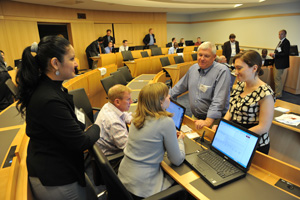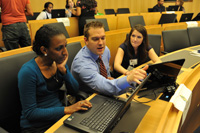Games Peacebuilders Play
If military folks play war games, then peace builders play peace games. But SENSE, or Strategic Economic Needs and Security Exercise simulation training, creates a world of make-believe in which only pragmatic decision-making actually pays off.
The president of Akrona was confronting a world of trouble. Inflation was up, jobs were in demand, AIDS funding was an issue and the possibility that ethnic conflict could recur were all pressing issues.
Good thing Akrona isn’t a real place. But if it was, the simulation training American government officials and others receive at the United States Institute of Peace would come in handy.
If military folks play war games, then peace builders play peace games. But SENSE, or Strategic Economic Needs and Security Exercise simulation training, creates a world of make-believe in which only pragmatic decision-making actually pays off. It’s designed to help players from U.S. and foreign governments, nongovernmental and international organizations, private sector personnel and the military learn the ropes of capacity building. Developed by the Institute for Defense Analyses (IDA), USIP has been conducting SENSE training since 1999 with its partners, George Mason University and the Defense Department.
Participants say it’s an excellent way to get real-world training – right at home.
IT MAKES SENSE – The simulation program is popular with government officials, from USAID, to the Pentagon to State and other agencies, because of how well it replicates the real world. Since 1999, USIP has trained more than 2,300 people over the course of 53 SENSE training events. The SENSE program was originally based on Bosnia, a country that was essentially developed from the ground up after the war in the Balkans. But USIP and IDA have modified the program to be like Iraq, and it has been successfully used by officials in Washington and countries such as Iraq. And there is an emerging demand for more SENSE training – as much as 11 training cycles to be held in just one year.
 LEAVING YOUR EXPERIENCE “AT THE DOOR” – Allison Frendak Blume from USIP and George Mason University plays the role of “game-master” for USIP’s SENSE training. She begins weeks before the training, vetting the resumes of each applicant and then marrying their experience and background with roles in the game. She says it’s often important not to put people with similar backgrounds in the same kind of role, because then they don’t necessarily learn as much.
LEAVING YOUR EXPERIENCE “AT THE DOOR” – Allison Frendak Blume from USIP and George Mason University plays the role of “game-master” for USIP’s SENSE training. She begins weeks before the training, vetting the resumes of each applicant and then marrying their experience and background with roles in the game. She says it’s often important not to put people with similar backgrounds in the same kind of role, because then they don’t necessarily learn as much.
“At some level, you bring your experience, but on another, you leave it at the door,” she says. The three-day game is supposed to represent several years in the development of Akrona, so minutes literally go by like hours and hours like months. Participants stay in their roles the entire game, talking with one another, forming alliances, and cutting deals. They use their computers to track the impacts of their decisions, monitoring trends and determining ways to spend their pretend resources. Inputs into the computer can have a real effect: during training at USIP in Washington in April, one participant mistakenly plugged 100,000 peacekeeping troops into the metric, “artificially” spiking Akrona’s economy and other factors. Ultimately, the impact of the false input was minimal, but it showed players the power in their hands.
MOVING MOUNTAINS WITH A CLICK – In April, USIP road-tested aspects of a new beta version of its SENSE program called “Akrona III” at its headquarters in Washington. The beta, currently being developed by SENSE creator Dr. Richard White of IDA, is based on a scenario in the same fictional country in which there is an active insurgency, adding an entirely new dimension to the game. One player, a U.S. Army civilian, played the role of the NATO commander, while another player, an analyst with the Defense Department, played Akrona’s minister of defense. His big focus? Counter-narcotics funding from the insurgency. Yet another player was in the role of a private firm that wanted to do reconstruction work but needed security in a country in which instability was growing. The Army civilian playing the role of NATO used her air and ground assets, including drones, to collect as much intelligence on the ground. Small gray clouds on her computer screen represented areas of the battle zone where she could not fully “see.” By reallocating her forces with a couple computer clicks, she could gain more intelligence. Adding more drones to the southern region of Akrona, for example, would improve her oversight of the battlefield. “I just made a cloud go away,” she said with mock self-satisfaction. With another click, she added more special forces to help the minister of defense curb the rise in roadside bombs.
 MAKING DRUG DEALS – Later, two other participants playing the role of drug traffickers walked up to Akrona’s defense minister with a proposal: “We’ll give you intelligence on insurgents if you leave us alone,” said one, suggesting they had information on militia members’ whereabouts. The drug traffickers would pay 20 percent of their profits to the government and provide intelligence. “It’s good for the country.” The offer was as realistic as anyone would find in the real world, and the defense minister bit. With a few more clicks on his computer, he adjusted the size of his Akrona police forces conducting counter-narcotic missions to reflect the deal. “We’re gonna keep the special narcotics forces low,” he said.
MAKING DRUG DEALS – Later, two other participants playing the role of drug traffickers walked up to Akrona’s defense minister with a proposal: “We’ll give you intelligence on insurgents if you leave us alone,” said one, suggesting they had information on militia members’ whereabouts. The drug traffickers would pay 20 percent of their profits to the government and provide intelligence. “It’s good for the country.” The offer was as realistic as anyone would find in the real world, and the defense minister bit. With a few more clicks on his computer, he adjusted the size of his Akrona police forces conducting counter-narcotic missions to reflect the deal. “We’re gonna keep the special narcotics forces low,” he said.
Noor Kirdar, who manages the SENSE program for USIP’s Academy for International Conflict Management and Peacebuilding, says that participants get the opportunity to practice negotiation skills and work with a variety of other actors. “They walk away with a better understanding of the individual, group, locale and international roles that are needed in resolving conflicts,” she says.
GETTING WITH THE PROGRAM – For some participants playing SENSE the first time, it can be hard to accept the computer program and the stream of information it provides. Yet it is essential to the integrity of the game, and in fact gives a real-world perspective as it ticks out numbers on the economy, child nutrition and trends in security. The Pentagon analyst playing the role of the minister of defense during the Arkona III field test joked that he needed an assistant just to monitor the computer. “I need a chief of staff for this computer stuff, but that’s not gonna happen,” he said. But SENSE overseers insist that it’s not a computer program – it’s “computer-supported game,” they say – and the computer aspect of SENSE is only there to help spur participants to network, talk with one another, negotiate and cut deals – all a part of real world capacity building. The computer aspect of the game keeps participants focused and ensures they don’t “make up” the impacts of a game and miss out on a learning moment. Or as Mike Lekson, deputy provost of USIP’s Academy for International Conflict Management and Peacebuilding says: “The computers are brutally honest.” The SENSE teaches many lessons, to include giving participants as close to hands-on experience in capacity and peace building as possible. “This is knowledge that they can apply, not just in Afghanistan and Iraq, but in all too many other places around the world,” he says.



